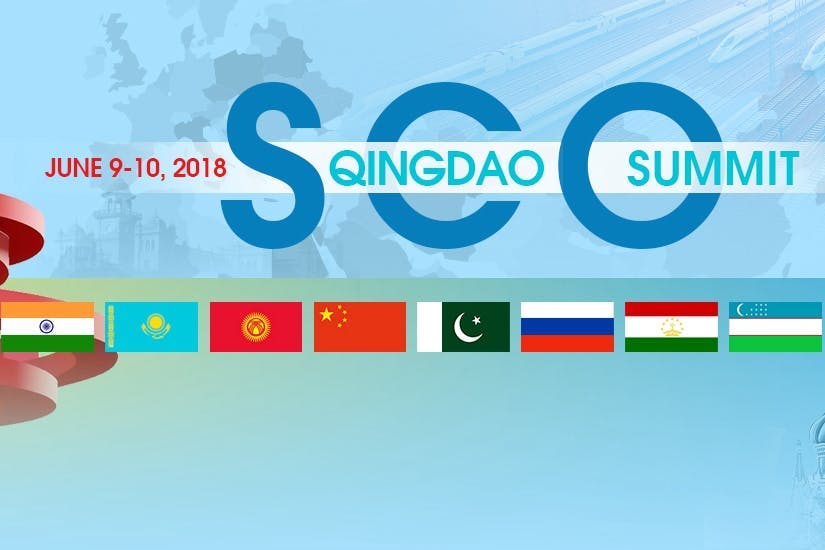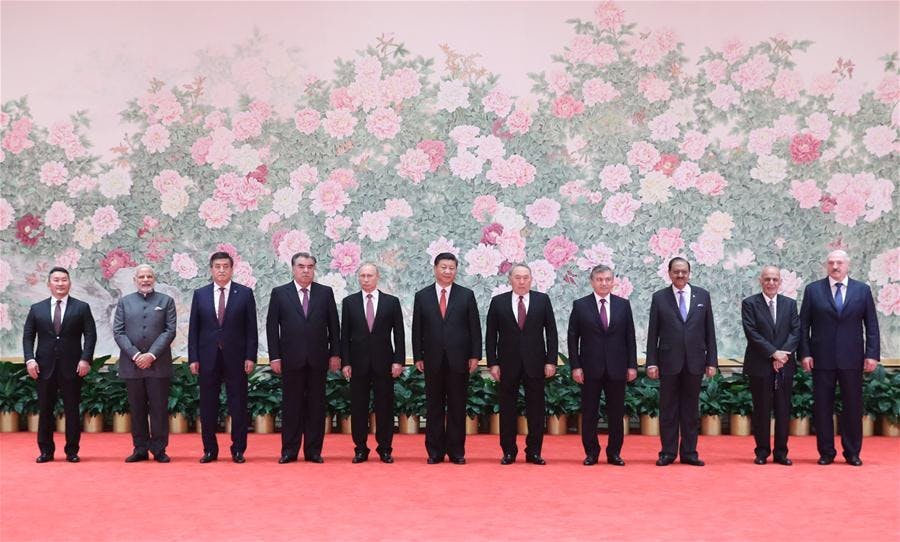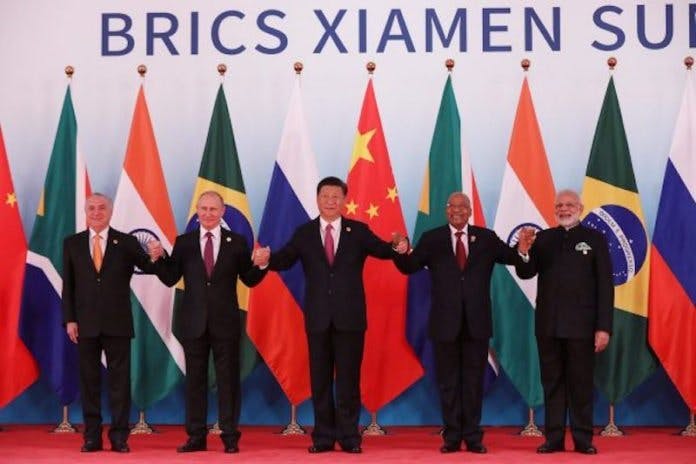What is in for Pakistan and India in SCO Qingdao Summit?

Various versions of this article appeared in The News International, Pakistan’s largest-selling daily (Op-Ed part 1, part 2), China Pictorial, China-India Dialogue (in English and Chinese) and 9 June Beijing Hour of China Radio International.
All eyes are on Eastern China’s coastal city Qingdao in Shandong Province which is hosting the 18th summit of the Shanghai Cooperation Organization (SCO), the world’s most populous regional bloc, today and tomorrow on 9-10 June. This is the first SCO summit since Pakistan and India became full members of the body at its Astana summit in Kazakhstan last year.
The SCO’s eight-member states now include China, Kazakhstan, Kyrgyzstan, Russia, Tajikistan, Uzbekistan, India and Pakistan. The states host nearly half of the world’s population and over 20 percent of the global GDP. Afghanistan, Belarus, Iran and Mongolia have observer status. Armenia, Azerbaijan, Cambodia, Nepal, Sri Lanka and Turkey are dialogue partners.
If we combine the SCO with China-proposed Belt and Road Initiative (BRI), the SCO member states will further improve cross-border logistics conditions and increase capacity. The SCO brings network, influence, leverage, big-boys club ranking, while BRI brings money, infrastructure and connectivity.
Some major joint projects have been completed in the SCO states including roadways, railways and power plants. According to official figures, China has so far built 21 economic and trade cooperation zones within the SCO countries.
The summit will announce new measures for building joint security. Fighting against the three evil forces of terrorism, separatism and extremism, drug trafficking and cybercrimes is among the top priorities of summit.
The summit will also roll out a blueprint for common development, particularly through Belt and Road Initiative (BRI) and approve five-year plan on SCO’s Treaty of Long-Term Good-Neighborliness, Friendship and Cooperation and ensure six core values of Shanghai Spirit – mutual trust, mutual benefit, equality, consultation, respect for diverse civilizations and pursuit of common development.
President Mamnoon Hussain will represent Pakistan while Indian Prime Minister Narendra Modi will represent his country. Modi will be the newsmaker on the show with whom President Xi Jinping has been warming up for several significant bilateral and regional objectives.

10 June 2018: SCO leaders pose for photo at Qingdao Summit.
Subscribe to our YouTube channel: Wali Zahid
Relations between Pakistan and India
Relations between Pakistan and India have been tense since their independence in 1947. They have fought three wars and have come close to wars several times in recent decades. Both countries are members of the South Asian Association for Regional Cooperation (SAARC), but the regional bloc has failed to achieve substantial progress, precisely because both countries cannot share stage on the forum.
This is the baggage with which Pakistan and India have been admitted into the SCO, which thus far had been considered a cohesive body. It is a newfound challenge for the SCO to keep two conflicting countries as members and achieve a win-win.
There has been modest progress by both countries on resolving their bilateral issues or contribution to SCO goals in regional development. The usual cross-border firing incidents along the Line of Control (LoC) and occasional war of words continued last year. It is usually only when the Director Generals of Military Operations (DGMOs) pick up the hotline the issues are de-escalated to status quo.
There is, though, some symbolic progress.
Both countries, each other’s enemy on surface, will participate in a joint military exercise to counter terrorism in Russia in September under the SCO’s Peace Mission 2018.
Last week’s (29 May) ceasefire agreement between both countries’ DGMOs on LoC and Working Boundary (WB) on Chinese prompt is a rare positive development. The event has been welcomed by US.
Another positive development was Regional Anti-Terrorist Structure (SCO-RATS) Legal Experts Group Meeting in Islamabad on 23-25 May, in which Indian side also participated.
However, the real progress will be removing mutual mistrust, easing of tensions and starting bilateral cooperation on all matters particularly in trade.
Pakistan election year
It is yet to be seen how India and Pakistan will behave as full members in SCO.
In Pakistan, this is election year. This weekend when the SCO summit happens, Pakistan’s PMLN government has completed its tenure, a caretaker setup is in place to conduct general elections and the new government will take charge in August. Election results will determine how ties with India take shape. Foreign and security policies in Pakistan are under army’s control which views India as enemy. A hung parliament may not tilt towards peace with India as Prime Minister Nawaz Sharif did after his 2013 general-elections win.
However, if Sharif’s party returns to power with majority in parliament, SCO banner will be a godsend to civilian government to make peace with India and open bilateral or transit trade.
Regionally speaking, it is in China’s interest that peace returns to Afghanistan, which has an Observer status in the eight-member body. Kabul sees massive casualties in bomb blasts on nearly daily basis. But Pakistan and India mistrust each other on their respective role in Afghanistan. For instance, India’s investment and development goals in Afghanistan are seen as strategic inroads by the army.
Besides, the four-member Quadrilateral Coordination Group (QCG) mechanism, which includes China, US, Afghanistan and Pakistan, or trilateral framework including China in addition to bilateral framework under Afghanistan-Pakistan Action Plan for Peace and Solidarity (APAPPS), has only seen lackluster progress.
Will SCO bring Pakistan and India closer?
Yes, and no.
The civilian government and military in Pakistan are not on the same page on how to deal with India. Some analysts say that army’s India-centric strategy is an attempt to secure more budgetary resources in this poor country. The civilians want to deal with India as a neighbor with which they do have issues but can still carry on like other neighbors do in the world and give diplomacy a chance.
Both Pakistan and India are nuclear powers so war is not an option.
At the same time, both Pakistan and India are poor countries with much of their population below poverty line. They can learn a thing or two from SCO’s rotating presidency, China, which brought its extreme poverty from 88 percent in 1981 to less than 3 percent in 2018.
If a weak government returns to power, the army will keep the status quo. A strong civilian government may deal with India with more confidence and the region finally may see some peace.
If and when peace returns, tourism alone can be a big economic boost for the region. Besides regional security and stability, one major priority of SCO is tourism development. SCO member states have seen major surge in in-bloc tourism, both inbound and outbound. Although there’s very little bilateral tourist movement, as opposed to business or CPEC visitors, between Pakistan and China.
India reaping fruits
India is going to be a big-time beneficiary of 18th SCO Summit at Qingdao. President Xi Jinping has been warming up to India after the Doklam pass standoff last year. China so far has failed to secure Indian support for the Belt and Road Initiative (BRI) because one of the projects, China-Pakistan Economic Corridor (CPEC), passes through Pakistan-administered Kashmir and partly because India sees the Initiative as an ambition for regional or global power.
In spite of India’s reservations, both countries’ foreign and defense ministers have visited each other’s capitals to prepare ground for Xi-Modi meeting at Qingdao.
China gave India an incentive too. In February 2018, unlike in the past when China vetoed UN resolutions on terror allegations on Pakistan, China did not veto the Financial Action Task Force on Money Laundering (FATF)’s greylisting of Pakistan for terror financing. This may be seen by many as a pull to India.
China’s foreign ministry, however, assures Islamabad that closer cooperation with India is not at the cost of Pakistan.
China is also not happy with the pace of development on CPEC infrastructure building, particularly slow pace on Special Economic Zones. Although China will wait a little further before it losing hope.
Pakistan’s media and politics duo and missed opportunities
On the other hand, Pakistan’s media and politics duo (coupled with militants wreaking havoc on a fragile Pakistan) could be blamed for much of the loss of opportunities that come Pakistan’s way.
If the past is any indication of the future, take the timelines of SCO Summits and Pakistan’s ties with China alone for example:
Xi Jinping visit: In 2014, the Chinese President Xi Jinping could not visit Pakistan because of dharna by the opposition PTI party, led by Imran Khan. Xi was to announce investing $46 billion in CPEC. The visit was delayed by a year.
Ufa Summit: In June 2015, when the SCO Summit took place in Ufa, Russia, no Pakistani media accompanied PM Sharif where he met Indian PM in addition to Russian and Chinese Presidents. At Ufa, Pakistan’s Full Membership to SCO was approved for further paperwork. It was also at this summit that President Xi broke to the world that CPEC had reached the stage of implementation. So, the news that needed to come from Pakistan’s state media came from Xinhua, the Chinese news agency.
Bishkek Summit: In November 2016, PM Sharif had to cancel his participation in the SCO Summit in Bishkek, Kyrgyzstan, only at the last minute because of 2 November lockdown announced by – guess who – Imran Khan’s PTI party.
BRF Beijing: In May 2017, when PM Sharif and his four chief ministers were in Beijing for China’s global Belt and Road Forum being attended by 29 foreign heads of states or governments, 10 labourers were killed in Gwadar and a convoy of Senate’s Deputy Chairman was attacked in Balochistan, killing another 28. Gwadar and Balochistan were the two keywords that would have featured on Sharif’s proud speech in Beijing, highlighting progress on CPEC milestones. The opportunity was turned into a tragedy back home.
Astana Summit: In June 2017, only a day after the Astana Summit, Pakistan’s army chief visited troops after the LoC violation, indicating things were turning worse. A day later, Pakistan Foreign Office summoned Indian Deputy High Commissioner to protest on the ceasefire violation. Within a week, commander of Army’s X Corps visited the Iftikharabad sector.
It was against this backdrop that in spite of being under one roof both PM Sharif and his Indian counterpart Narendra Modi could not go beyond customary greetings and have one-on-one or a bilateral meeting. An opportunity to repair relations was wasted.
Next month in July 2017, PM Sharif was disqualified as a member of parliament and as PM through a Supreme Court verdict on Panama investigation.
Foreign Ministers meeting: In April 2018, Foreign Minister Khawaja Asif attended SCO foreign ministers meeting in Beijing but was unable to meet his Indian counterpart, External Affairs Minister Sushma Swaraj. In less than a week after this meeting Asif too was disqualified as a member of parliament through a High Court. Although his disqualification now has been overturned by the Supreme Court.
Qingdao Summit: This weekend when the SCO summit is held in Qingdao, an interim caretaker setup is in place to hold general elections. President Mamnoon Hussain, who has no powers, can only represent Pakistan figuratively. He is slated to meet Xi Jinping and President Putin of Russia.
The way forward
So, will Pakistan be able to benefit from the SCO framework to increase economic opportunities for its millions of poor people? How will the relationships with neighbors – India, Iran and Afghanistan – reshape for better after Pakistan’s SCO membership upgrade? And, will Pakistan’s politicians and media behave differently now that we are in a different league? The jury is still out.
However, if there is a way forward, this is only possible if the media and politicians mend their ways. When it comes to international opportunities, politicians need to leave behind their petty politics. Instead of conspiring to time their street agitations on every global opportunity that comes Pakistan’s way, they need to appeal to voters based on their respective performances in their governed provinces.
More than 3,500 TV shows were run on Pakistan’s broadcast media in a year from April 2016 to April 2017 on Panama Scandal through which three-time Prime Minister Sharif was disqualified for life. How many shows were organized on SCO, ties with China, CPEC, Belt and Road, or economic growth? These could be counted on fingers.
This media blackout of substantive issues facing Pakistan is further aggravated when combined with false propaganda and fake news on social media and WhatsApp. I speak on CPEC and Belt and Road in all parts of Pakistan to all sorts of audiences, but people I meet come with hardly any actual knowledge of what CPEC, Belt and Road or SCO stand for.
The SCO membership and China could only help Pakistan get into the door. It needs to be our own national effort with two pillars - media and politics - playing their visionary and futuristic role, which could help Pakistan reap the benefits and, like China, take our millions out of poverty. This is the only way.
The writer is President of Institute of Media and Communication (IMC) in Pakistan, a Pakistan futurist and longtime China-watcher. An award-winning journalist and formerly Editor of The News, Lahore, Pakistan’s largest-selling daily, he writes on issues of significance to Pakistan and CPEC & BRI. He was a high-level delegate at Belt & Road Forum 2017 in Beijing. Twitter: @walizahid

Wali Zahid
Wali Zahid is a longtime China watcher and a Pakistan futurist. An award-winning journalist, he writes on issues of significance to Pakistan and CPEC & BRI.
Related posts
